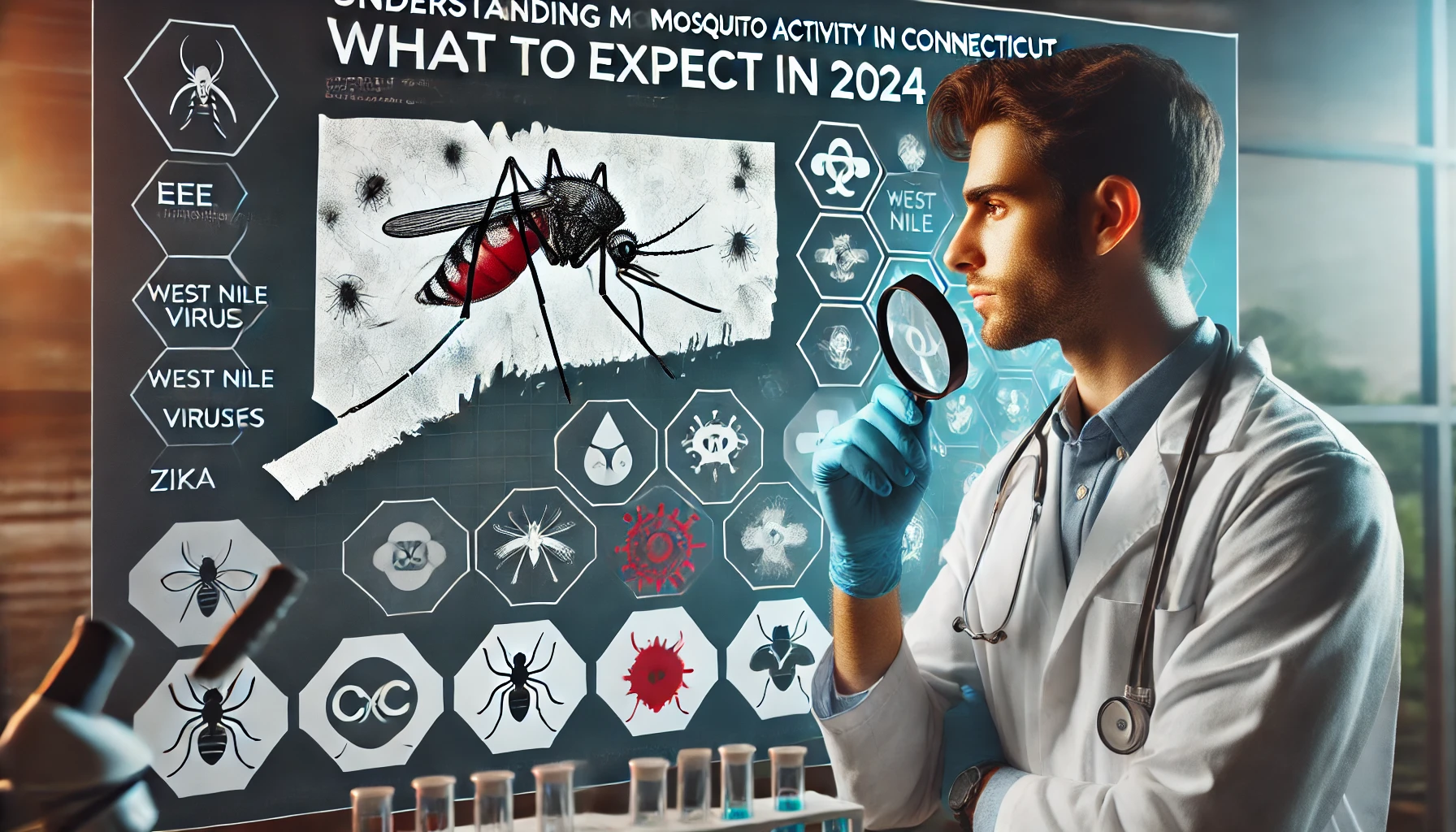Mosquitoes in Connecticut: What to Expect in 2024
Eastern Equine Encephalitis (EEE) found in mosquitoes in Connecticut this summer has raised concerns among residents. As we navigate through 2024, understanding mosquito activity and the associated health risks is crucial for safeguarding public health. This comprehensive guide will delve into the current mosquito situation, diseases carried by mosquitoes, and effective prevention strategies to keep you and your loved ones safe.
Current Mosquito Situation and Activity in Connecticut
Mosquitoes in Connecticut 2024
Connecticut’s mosquito population has been closely monitored in 2024, with increased activity noted in several regions. The warm and humid climate during the summer months provides an ideal breeding ground for mosquitoes, leading to a surge in their population.
Connecticut Summer Mosquitoes
Summer mosquitoes in Connecticut are not just a nuisance; they pose significant health risks due to the diseases they carry. This year, residents have reported higher mosquito activity, prompting public health officials to issue warnings and guidelines to minimize exposure.
Mosquito Population Connecticut 2024
The mosquito population in Connecticut for 2024 has seen a notable increase compared to previous years. Factors such as climate change, urbanization, and stagnant water sources contribute to the proliferation of these pests.
Connecticut Mosquito Activity 2024
Connecticut mosquito activity in 2024 has been meticulously tracked by health departments. Peak activity typically occurs during dusk and dawn, making these times particularly risky for outdoor activities.
Mosquito Season Connecticut 2024
The mosquito season in Connecticut for 2024 is expected to extend longer than usual, starting from late spring and continuing through early fall. This extended season increases the likelihood of mosquito-borne illnesses spreading among the population.
Diseases and Health Concerns
EEE Found in Mosquitoes in Connecticut
Eastern Equine Encephalitis (EEE) found in mosquitoes in Connecticut is a significant health concern. EEE is a rare but serious disease transmitted by mosquitoes, leading to severe neurological conditions in humans and animals.
Diseases in Mosquitoes Connecticut
In addition to EEE, mosquitoes in Connecticut are carriers of various diseases, including:
- West Nile Virus: A common mosquito-borne illness causing flu-like symptoms and, in severe cases, neurological complications.
- Zika Virus: Known for causing birth defects and neurological issues, particularly dangerous for pregnant women.
- Dengue Fever: Causes high fever, severe headaches, and joint pain, potentially leading to more severe complications.
West Nile Virus Connecticut 2024
West Nile Virus in Connecticut 2024 has been reported in several counties. This virus, primarily spread by Culex mosquitoes, poses a risk of serious illness, particularly for older adults and individuals with weakened immune systems.
Mosquito-Borne Illnesses Connecticut
Mosquito-borne illnesses in Connecticut are a growing concern as the mosquito population increases. Public health campaigns are focused on educating residents about these illnesses and how to protect themselves.
Zika Virus Connecticut Summer 2024
Zika virus in Connecticut during the summer of 2024 has prompted increased surveillance and preventive measures. The virus’s potential impact on pregnant women and newborns underscores the importance of mosquito control efforts.
Prevention and Safety Tips
How to Prevent Mosquito Bites Connecticut
Preventing mosquito bites in Connecticut requires a combination of personal protection measures and environmental control. Here are some effective strategies:
- Use Repellents: Apply EPA-approved insect repellents containing DEET, picaridin, or oil of lemon eucalyptus.
- Wear Protective Clothing: Dress in long sleeves and pants when outdoors, especially during peak mosquito activity times.
- Install Screens: Ensure windows and doors have screens to keep mosquitoes out of your home.
- Eliminate Standing Water: Regularly empty and clean items that collect water, such as birdbaths, flower pots, and gutters.
Prevent Mosquito Bites Connecticut
Taking proactive steps to prevent mosquito bites can significantly reduce the risk of mosquito-borne diseases. Communities can also participate in local mosquito control programs and report any concerns to public health authorities.
Connecticut Summer Mosquitoes: Safety Measures
To stay safe from Connecticut summer mosquitoes, consider these additional safety measures:
- Avoid Peak Activity Times: Limit outdoor activities during dusk and dawn when mosquitoes are most active.
- Use Mosquito Nets: Use mosquito nets over beds, especially for infants and young children.
- Support Community Efforts: Participate in community clean-up events to reduce mosquito breeding sites.
The Path Forward: Adapting to the Mosquito Surge
Community Efforts and Responsibility
Community efforts play a vital role in managing mosquito populations and reducing the risk of diseases. Local health departments often collaborate with residents to implement effective mosquito control measures.
Public Health Campaigns
Public health campaigns aim to educate the public about the risks associated with mosquitoes and the importance of preventive measures. These campaigns use various media platforms to reach a broad audience and disseminate critical information.
Research and Innovation
Ongoing research and innovation in mosquito control technologies and disease prevention strategies are essential. Scientists and public health experts are continually developing new methods to combat mosquito-borne illnesses.
Conclusion
Eastern Equine Encephalitis (EEE) found in mosquitoes in Connecticut this summer underscores the importance of vigilance and proactive measures. By staying informed about the current mosquito situation, recognizing the diseases they carry, and implementing effective prevention strategies, we can protect ourselves and our communities. For more detailed information and educational resources, visit Regent Studies.
In summary, EEE found in mosquitoes in Connecticut highlights the need for comprehensive mosquito control and public awareness. Understanding the risks, adopting safety measures, and supporting community efforts are crucial steps in mitigating the impact of mosquito-borne diseases. Stay safe, stay informed, and take proactive measures to protect your health during the summer of 2024.
For further reading on mosquito-borne diseases and prevention, you can visit the Centers for Disease Control and Prevention (CDC).




